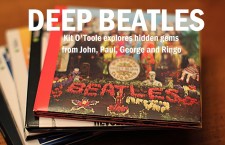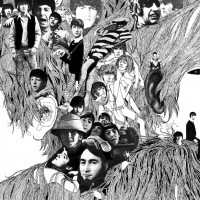Any conversation about the Beatles inevitably leads to one place: The Desert Island Disc. (Well, actually, it passes through Which One Is Your Favorite — somebody else can deal with that one — but it ends up, inevitably, with this eternal question.)
Too often, if you ask me, the answer is 1967’s Sgt. Pepper’s Lonely Hearts Club Band, which to my mind is too much of a period piece (and doesn’t have any strong work from George); or the more obvious Abbey Road, which (as good as it is) is too Paul-heavy and simply ubiquitous.
There was a time when I said 1968’s The Beatles, more commonly known as “The White Album.” After all, it has so many song styles, so many turns for each of the Fab(ulously fractured, at this point) Four to express their own individuality, that it not only makes the title seem sadly ironic … but ensures that any future generation on your little island will be exposed to everything from air-tight and ironic pop (“Back in the U.S.S.R.,” “Savoy Truffle”) to country (“Don’t Pass Me By”) to experimental music (“Revolution No. 9”) to hard rockers (“Revolution,” “Helter Skelter”) to classic Beatles flower power (“Dear Prudence,” “Mother Nature’s Son”) to the truly unnameable (“Why Don’t We Do It in the Road,” “Bungalow Bill”) to the group’s best collaboration (with Eric Clapton, on “While My Guitar Gently Weeps”) to Wings-esque artistry (“Martha My Dear”) to sweet orchestral reverie (“Good Night”).
But, that seems like a cop out. This was, after all, no Beatles album — but a series of solo tracks featuring some or none of the fellow group members.
Instead, I give my nod to 1966’s Revolver, a triumph in every important way for any Beatle fan.
Revolver is both sublime (“Got To Get You Into My Life,” a tune so inherently funky that Earth, Wind and Fire covered it) and fun (Ringo’s timeless “Yellow Submarine”). It’s folky (“Here, There and Everywhere”), but never hokey: “Eleanor Rigby” is a tune of effortless artistry, well beyond their young years. George Harrison’s contributions are finally measurable, as his “Taxman” kicks off the album with a snotty, rocking blast of perfect pop.
There is also the romantic release of Paul McCartney in “Good Day Sunshine” — and the cool-rocking John Lennon side, “And Your Bird Can Sing.” I love the genuine wonder in George’s “Love You Too.” This is his best Indian-influenced tune of all, and his first. There is the expected mid-’60s psychedelia from Lennon, with more humor (in “She Said”) and a growing sense of genuine alienation (“Tomorrow Never Knows”), than in all but the best of the rest. (That being “Strawberry Fields Forever,” of course.)
Lastly, this is the Beatles’ first genuine foray into something outside of their already-comfortable pop-song structures, so it must be recognized for that. For pure artistry, off-beat innovation and pure giddy fun, it’s the ultimate pop experiment.
- Nick DeRiso’s Best of 2015 (Rock + Pop): Death Cab for Cutie, Joe Jackson, Toto + Others - January 18, 2016
- Nick DeRiso’s Best of 2015 (Blues, Jazz + R&B): Boz Scaggs, Gavin Harrison, Alabama Shakes - January 10, 2016
- Nick DeRiso’s Best of 2015 (Reissues + Live): John Oates, Led Zeppelin, Yes, Faces + others - January 7, 2016



